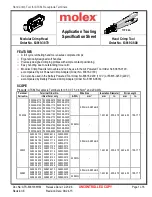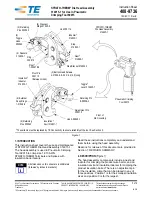
Jabiru Aircraft
Pilot Operating Handbook
Model J230-D
Revision:
6
28/2/2020
Page 26
3.3.3
Forced Landings
Emergency Landing Without Engine Power
1.
Airspeed ................................................................ 65 KIAS
2.
Ignition .................................................................. OFF
3.
Fuel Shutoff Valve ................................................. OFF
4.
Fuel Pump ............................................................. OFF
5.
Throttle .................................................................. CLOSED
6.
Wing Flaps ............................................................ FULL PRIOR TO TOUCH DOWN
7.
Master Switch ........................................................ OFF AFTER LOWERING FLAPS
8.
Braking .................................................................. HEAVY AFTER TOUCH DOWN
Precautionary Landing With Engine Power
1.
Airspeed ................................................................ 70 KIAS
2.
Fuel Pump ............................................................. ON
3.
Wing Flaps ............................................................ TAKE-OFF
4.
Selected field ......................................................... OVERFLY & INSPECT
5.
Wing Flaps ............................................................ FULL ON FINAL APPROACH
6.
Airspeed ................................................................ 65 KIAS
7.
Braking .................................................................. HEAVY AFTER TOUCH DOWN
8.
Ignition .................................................................. OFF
9.
Fuel Shutoff Valve ................................................. OFF
10. Master Switch ........................................................ OFF
Ditching
1.
Airspeed ............................................................. 65 KIAS
2.
Power (if available) ............................................. ESTABLISH 50 ft/min @ 55 KIAS
3.
Approach
High Winds, Heavy Seas .......................... INTO WIND
Light Winds, Heavy Swells ........................ PARALLEL TO SWELLS
4.
Wing Flaps ......................................................... FULL PRIOR TO TOUCH DOWN
5.
Crew ................................................................... BRIEF
6.
Doors ................................................................. OPEN
7.
Face ................................................................... CUSHION AT TOUCH DOWN
8.
Touch Down ....................................................... SLOWEST PRACTICAL SPEED
9.
Evacuate ............................................................ IF REQUIRED BREAK WINDOWS
10. Life Jackets / Life Rafts ....................................... INFLATE
11. EPIRB (If Carried) ............................................... ACTIVATE
3.3.4
Fires
Engine Fire During Start
On Ground
1.
Ignition................................................................ OFF
2.
Fuel Shutoff valve ............................................... OFF
3.
Fuel Pump .......................................................... OFF
4.
Master Switch .................................................... OFF
5.
Abandon aircraft
6.
Fire ..................................................................... EXTINGUISH
CAUTION
If the fire is in the engine bay do not remove the cowlings. Removing cowls will provide more air
to the fire, accelerating combustion.
















































